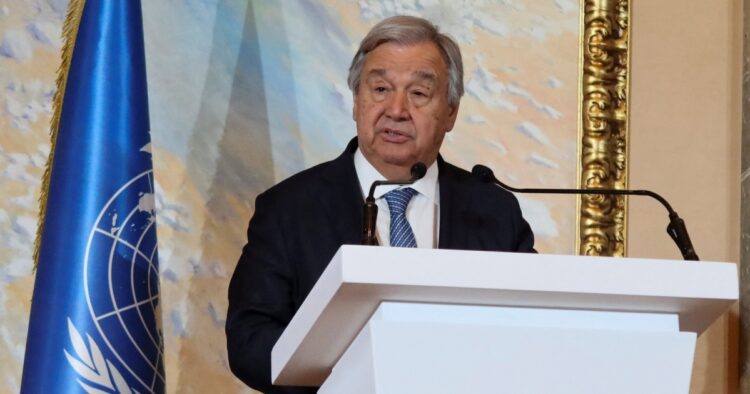KEY POINTS
- Same “restraint” line after Pulwama and Pahalgam.
- Lied about CAA targeting Indian Muslims.
- Banned by Israel for siding with terror groups.
The recent statement by UN Secretary-General Antonio Guterres, urging India and Pakistan to exercise “maximum restraint” after the brutal massacre in Pahalgam, once again shows his typical approach. While he condemned the killing of civilians, he completely avoided mentioning that the attack was carried out by Islamic terrorists who deliberately targeted tourists based on their religious identity. This silence on the issue o f Islamic terrorism has now become a noticeable trend in Guterres’s statements.
This is not the first time Guterres has made such one-sided remarks. Back in 2019, after the Pulwama terror attack by Pakistan-based terrorists killed 40 Indian soldiers, India responded with an air strike on Balakot. At that time too, Guterres released a similar statement asking both India and Pakistan to show restraint. Again, there was no strong condemnation of terrorism or of Pakistan’s role in harboring terror groups like Jaish-e-Mohammed and Lashkar-e-Taiba. The UN chief seemed more interested in balancing the blame rather than calling out the real source of the violence.
Guterres’s statements against India have gone beyond just security matters. In August 2019, when the Indian government abrogated Article 370 and reorganized the state of Jammu and Kashmir, Guterres voiced his concerns and advised India not to take any steps that could change the region’s status. He referred to the Simla Agreement of 1972, yet failed to acknowledge that the move was made entirely within India’s constitutional framework and was a sovereign decision aimed at integrating the region better with the rest of the country.
Further, Guterres raised objections even after India passed the Citizenship Amendment Act (CAA) in December 2019. Without any evidence, he warned about the “risk of statelessness for two million Muslims,” a claim that had no connection with reality. The CAA does not affect Indian Muslims at all; it only offers protection to persecuted minorities from Pakistan, Bangladesh, and Afghanistan. Despite this, Guterres made his anti-India statement from Pakistan’s capital, Islamabad, just before the visit of U.S. President Donald Trump to India. This timing raised questions about the political motivations behind his remarks.
The situation in Delhi during that time worsened when communal riots broke out. Yet again, Guterres chose to speak about “discrimination against minorities in India” without acknowledging the deeper causes or the role of instigators. His statements painted a picture of India that was far from reality and seemed to selectively highlight narratives that suited certain agendas.
This pattern of ignoring the real threats India faces, especially from terrorism, and instead issuing generalized or India-critical statements is not limited to the subcontinent. Guterres has also faced serious criticism from other nations. In 2024, Israel’s Foreign Minister, Israel Katz, declared Antonio Guterres persona non grata, banning him from entering Israel. Guterres failed to unequivocally condemn Iran’s large-scale missile attack and the atrocities committed by Hamas on October 7. Israel accused him of siding with terror groups like Hamas and Hezbollah and called him a disgrace to the United Nations. This sharp criticism shows that it’s not just in India’s case; Guterres has been perceived as sympathetic to known terrorist organizations in other regions as well.
The Israeli Ministry of Foreign Affairs strongly criticized Guterres for failing to support Israel during its time of crisis, highlighting a larger concern about the UN’s current leadership. Iran’s missile strike on Israel, involving nearly 200 missiles, was intercepted with international support, including from the U.S. Even in this grave situation, Guterres’s statements did not reflect the severity of the terrorist aggression.
These events show a consistent pattern: when democratic countries face terror threats or act to protect their national interests, Antonio Guterres tends to issue soft, generalized statements, while staying silent on the real culprits. When it comes to India, he repeatedly makes remarks that either ignore facts or play into anti-India narratives, whether it’s in response to acts of terror, internal legal reforms, or citizenship laws that have no connection to Indian Muslims.
This repeated behavior has led to rising concerns globally about whether the United Nations, under Antonio Guterres, is fulfilling its role fairly. Instead of being a neutral and supportive voice in global crises, the UN’s top leadership appears to be biased, inconsistent, and often silent on terrorism, especially when it comes to Islamic radicalism and cross-border attacks. These trends raise serious questions about the credibility and direction of the United Nations in its current form.

















Comments